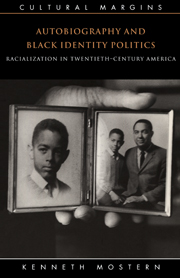Book contents
- Frontmatter
- Contents
- Acknowledgments
- Part one: Theorizing race, autobiography, and identity politics
- Part two: The politics of Negro self-representation
- 3 Three theories of the race of W. E. B. Du Bois
- 4 The gender, race, and culture of anti-lynching politics in the Jim Crow era
- 5 Representing the Negro as proletarian
- Part three: The dialectics of home: gender, nation, and blackness since the 1960s
- Notes
- Works cited
- Index
4 - The gender, race, and culture of anti-lynching politics in the Jim Crow era
Published online by Cambridge University Press: 02 December 2009
- Frontmatter
- Contents
- Acknowledgments
- Part one: Theorizing race, autobiography, and identity politics
- Part two: The politics of Negro self-representation
- 3 Three theories of the race of W. E. B. Du Bois
- 4 The gender, race, and culture of anti-lynching politics in the Jim Crow era
- 5 Representing the Negro as proletarian
- Part three: The dialectics of home: gender, nation, and blackness since the 1960s
- Notes
- Works cited
- Index
Summary
As an American Negro, I consider the most fortunate thing in my whole life to be the fact that through childhood I was reared free from undue fear of or esteem for white people as a race; otherwise, the deeper implications of American race prejudice might have become a part of my subconscious as well as my conscious self.
James Weldon JohnsonFrom what I had read and heard, Negroes were supposed to write about the Race Problem. I was and am thoroughly sick of the subject. My interest lies in what makes a man or a woman do such-and-so, regardless of his color.
Zora Neale HurstonI am not white. There is nothing within my mind and heart which tempts me to think I am. Yet I realize acutely that the only characteristic which matters to either the white or the colored race – the appearance of whiteness – is mine.
Walter WhiteWe have associated too long with the white man not to have copied his vices as well as his virtues.
Ida B. Wells BarnettMiddle class politics in the first half of the twentieth century
This chapter is about raced-gender formation in the broad African-American professional class during the long period that extends from the 1890s, which saw the solidification of the legal foundations of Jim Crow with Plessy v. Ferguson and the promulgation of the new southern state constitutions, through World War II.
- Type
- Chapter
- Information
- Autobiography and Black Identity PoliticsRacialization in Twentieth-Century America, pp. 83 - 111Publisher: Cambridge University PressPrint publication year: 1999

